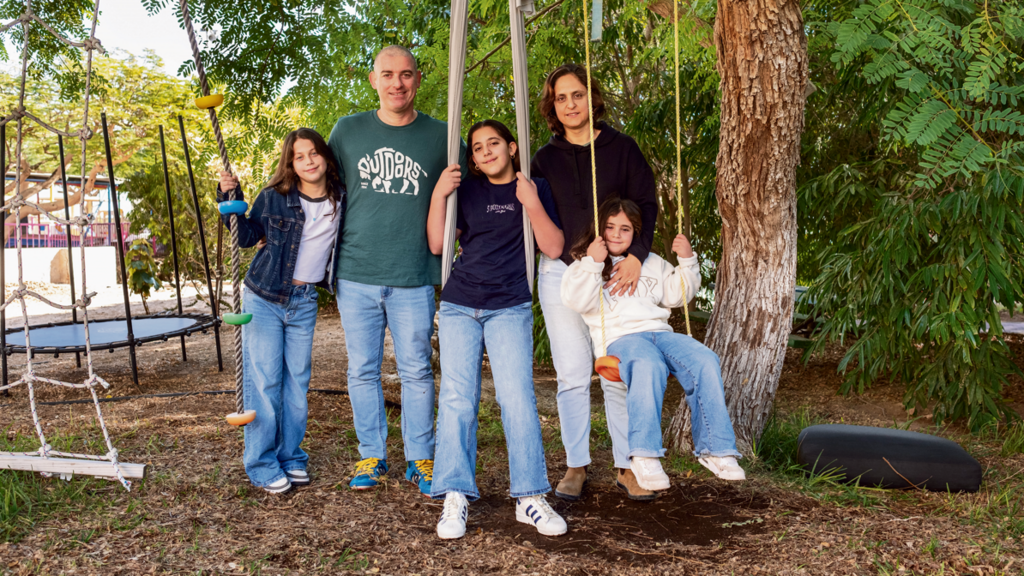The Bachar family resides in a rented, two-unit home in Kibbutz Eilot. “With the education we want for our daughters, we’re paying 13,500 shekels. It’s not cheap, but there’s a waiting list to live here,” says Maor.
Why Eilot?
Four years ago, Maor and his wife, Dvora, moved from Herzliya to Israel’s Arava region.
“I was born in Tehran and arrived in Israel at age 7, a decade after the Iranian Revolution,” Dvora recounts. “The Mossad smuggled us out. My father, who owned many businesses, didn’t believe everything would collapse. But the Iran-Iraq War changed everything when Khomeini ordered boys as young as 13 to be drafted. My father refused to let that happen to my brother.”
Growing up Jewish in Iran
“It was horrible,” Dvora recalls. “Khomeini shut down Jewish schools and ended the golden era of Iranian Jewry. When we decided to leave, it took four attempts to board a plane with forged passports. We left with $60,000 while abandoning millions of dollars in assets.”
Her family resettled in Beersheba, where Dvora joined the IDF at 18, despite resistance from her parents. “The military was transformative for me, breaking the mold of my conservative Persian upbringing,” she says.
A career in security
As an IDF officer, Dvora later joined the Shin Bet's operational unit before transitioning to the Prime Minister’s Office to focus on Iranian affairs. “I wanted to advance, but I hit a wall. After October 7, it’s clear to me that these systems are rotten to the core,” she says. “The failures we see stem from years of poor leadership that pushed out the best minds. At 39, I left because I refused to let another man tell me why I couldn’t succeed.”
Maor’s Journey
Maor studied medicine in Hungary after struggling to gain admission in Israel. He became a pediatrician, working in Herzliya and Tel Aviv. “We loved Herzliya, even bought a house there. But during COVID-19, we both worked non-stop, barely seeing each other. That’s when we decided to make a change.”
The Move to Eilat
Maor accepted an offer to head the Children’s Health Center at Yoseftal Hospital. “Initially, Dvora wasn’t on board,” he recalls. “She said, ‘Eilat? That’s the end of the world.’ But I convinced her it aligned with our values—our daughters would grow up in a kibbutz, away from the materialism we saw in Herzliya.”
Dvora’s new mission
Inspired by her background, Dvora launched a high school intelligence program in Eilat. “I commanded teams of analysts doing intelligence work. Strip away the classified elements, and it’s all about skills,” she explains.
Get the Ynetnews app on your smartphone: Google Play: https://bit.ly/4eJ37pE | Apple App Store: https://bit.ly/3ZL7iNv
She convinced the Eilat mayor to support her vision of preparing local teens for elite military units, often dominated by youth from affluent areas like Herzliya. With funding, laptops and trips to Tel Aviv, the program now boasts 70 students.
“This year, 10 seniors were accepted into elite intelligence units like Unit 8200, eight into pre-army programs and two into the Air Force flight course. Eilat’s students are finally part of the story,” she says.
Maor faces a different challenge. “We’re just three pediatricians for 9,000 children. Doctors don’t want to come here because the pay is low. I’ve managed to bring 15 visiting physicians to ease the workload, but it’s still overwhelming,” he says.
“Living here makes saving possible,” Dvora says. “The periphery isn’t cheap, but the simpler lifestyle helps.”
On Fridays, the family spends afternoons at the beach. “We lay out a mat, enjoy the sea and have dinner together. It’s our family time,” Maor says.


